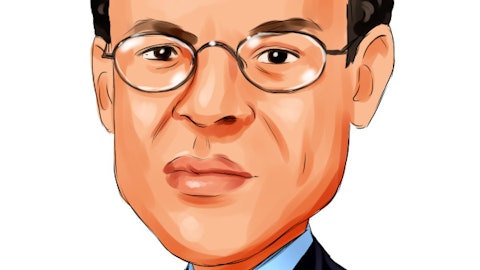Rob Capps: Yes, there’s no doubt there’s benefit. The biggest benefit, Tyson, is if we have some visibility down the road as to production requirements, we can be much more efficient in buying, buy bigger lots, things like that. So, we can be much more efficient and we can be more efficient in the factory as well. So that certainly has a benefit. Now, to be fair, the counter to that is there are various inflation out there. So, I think we would expect some improvement, but it is going to be mitigated to some extent by just general inflation and supply chain issues, lead times, things like that are still out there.
Tyson Bauer: You talked about Seamap having a robust market. Sometimes those delivery schedules can get a little lumpy on those system sales. As you look at Q2 or in the next couple of quarters, any ideas on those delivery schedules on whether they’re concentrated in one quarter or next, or do we have a fairly even flow?
Rob Capps: Yes. You sound like you’ve been in some of our operational meetings. We’re trying to have a more even flow. So that’s the way we schedule things. But as I said, you have some key components that you don’t get delivered when they’re scheduled to be delivered, and that can slip things a bit. So, I’m reluctant to be too definitive with that just because you have a [$3 million] (ph) order that you can’t ship because of some component, then that has a big impact. But we are — we do have better visibility, I think, this year than we have in the past and not just to Seamap, but that client as well. So, we think we’re better able to do some planning and be a bit more efficient. That’s something we’re really working hard to do.
Tyson Bauer: Okay. In the news recently, there have been a lot of discussions of the Saudis major offshore expansions. I think their oil field offshore, they’re trying to double or triple the size of that. [indiscernible] energy analysts yesterday coming out a lot of offshore activities, which you should be a beneficiary of…
Rob Capps: Well, I think it’s right. There is definitely seismic exploration offshore that is — and onshore for that matter, that is contemplated with those projects. And I think any time there’s offshore seismic exploration, we benefit from that.
Tyson Bauer: And you really have a lot less competition than people remember from even a year or two years ago with one of your major competitors exiting.
Rob Capps: That’s true. When it comes to digital source controllers, we really don’t have a competition at this point.
Tyson Bauer: Capital requirements, obviously, we needed that infusion. We talked about that in the last conference call, that $3-plus million. You almost benefit if you do have a little delay just because you get a working capital benefit, say, in Q2 or whatever that helps out your operating cash flows. But in general, your working capital, are we to that stage where we can roll it so there is no real deficit, we’re just now into a systematic role on cash conversion?
Rob Capps: Yes, that’s a complicated question. I think we certainly are approaching that point, as the cash flow from the last couple of quarters would indicate. But I think the wildcard there is when you get into procurement of larger amounts for more systems, larger systems, then that can create some additional demands for advanced payments, prepayments, things of that nature. You’re going to do a larger purchase for — to buy components for four systems, which is not going to produce the last two until two quarters out. So, it can work both ways. So it’s something we have to balance on a, frankly, daily basis.
Tyson Bauer: Okay. So, we might see that accordion feature on those real estate secured financing being utilized temporarily just to get you through a quarter or two, but overall, you’re in good shape?
Rob Capps: I think that’s fair to say.




